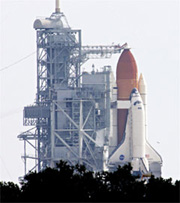 |
| The Space Shuttle Discovery sits on Launch Pad 39B at the Kennedy Space Center. |
The launch of the Discovery space shuttle has been delayed for several days because of technical problems.
No new launch date has been set, but Nasa managers say the most optimistic possibility for the next attempt could be as early as Saturday.
The US space agencyabortedWednesday's launch shortly before lift-off when a fuel sensor started to play up.
The orbiter was set to make the first flight since the loss of Columbia and its crew of seven in February 2003.
All seven members of the crew died in the accident.
Discovery's astronauts had all been strapped into the shuttle and were preparing for blast-off when the order came through to stand down.
Nasa's chief administrator Mike Griffin told reporters he did not know whether the problem could be fixed at the launch pad or would require the shuttle to be rolled back into itshangar.
The latter would mean a lengthy delay to Discovery's mission to the International Space Station.
The faulty sensor is one of four in the shuttle's external tank responsible for making sure the spacecraft's engines shut down at the proper point during the ascent.
The sensors ensure the engines are not suddenly starved of propellants and are switched off in a controlled fashion.
Nasa said it appeared that one sensor was showing a low level on the part of the tank containing the hydrogen propellant - even though the tank had been fully topped up ready for launch.
The sensors "for some reason did not behave today and so we're going to have to scrub this launch attempt," launch director Mike Leinbach informed colleagues.
"So appreciate all we've been through together, but this one is not going to result in a launch attempt today," he added.
The current launch window runs until the end of July, after which Discovery would have to wait until September to get airborne.
The long wait results from the need to have the International Space Station in the right position in orbit and Nasa's desire to launch during daylight hours so it can photograph all aspects of the ascent.
Discovery's mission will be the first for a space shuttle in two and a half years.
The agency says it has learnt the lessons of the Columbia accident.
(BBC)
|
